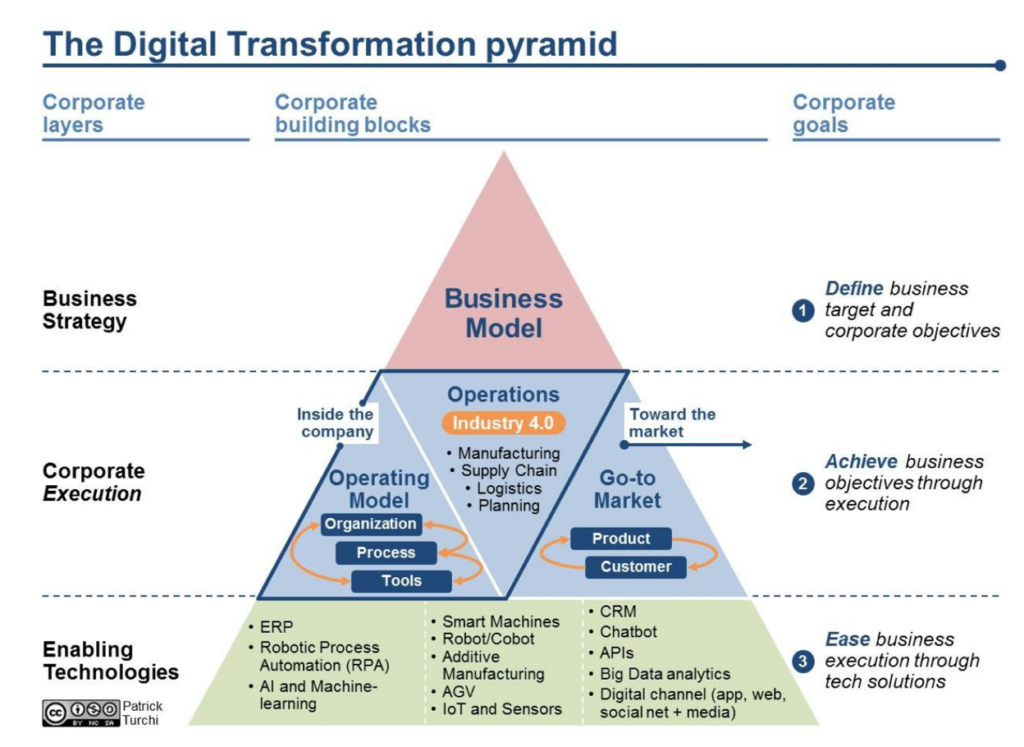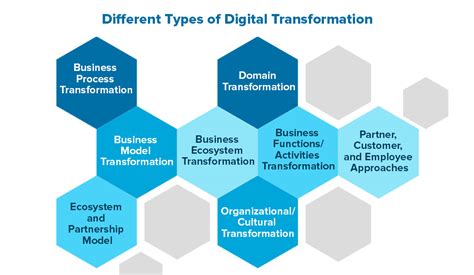
Understanding Digital Transformation Experience
Customer expectations are constantly evolving in the digital era. Through digital transformation, Organizations can deliver personalised and seamless experiences across multiple touchpoints. This leads to higher customer satisfaction, loyalty, and retention.
Overall, digital transformation is essential for organisations to adapt, thrive, and succeed in today’s dynamic business environment.
Key Benefits of Digital Transformation
Implementing digital transformation strategies can bring numerous advantages and benefits to organisations and individuals:
Enhanced Operational Efficiency
Digital transformation can streamline processes, automate tasks, and eliminate manual work, improving efficiency and productivity.
Impact on Employee Productivity
By implementing digital tools and technologies, employees can work more efficiently, collaborate effectively, and access information quickly, increasing productivity.
Better Data-Driven Decision Making
Digital transformation enables organisations to collect, analyse, and utilise data effectively, allowing for informed decision-making and identifying opportunities for growth and improvement.
Improved Customer Experience
By embracing digital transformation, organisations can enhance customer interactions, personalise experiences, and provide seamless omnichannel experiences, improving satisfaction and loyalty.
Overall, digital transformation empowers organisations to become more agile, competitive, and adaptable in the rapidly changing digital landscape.
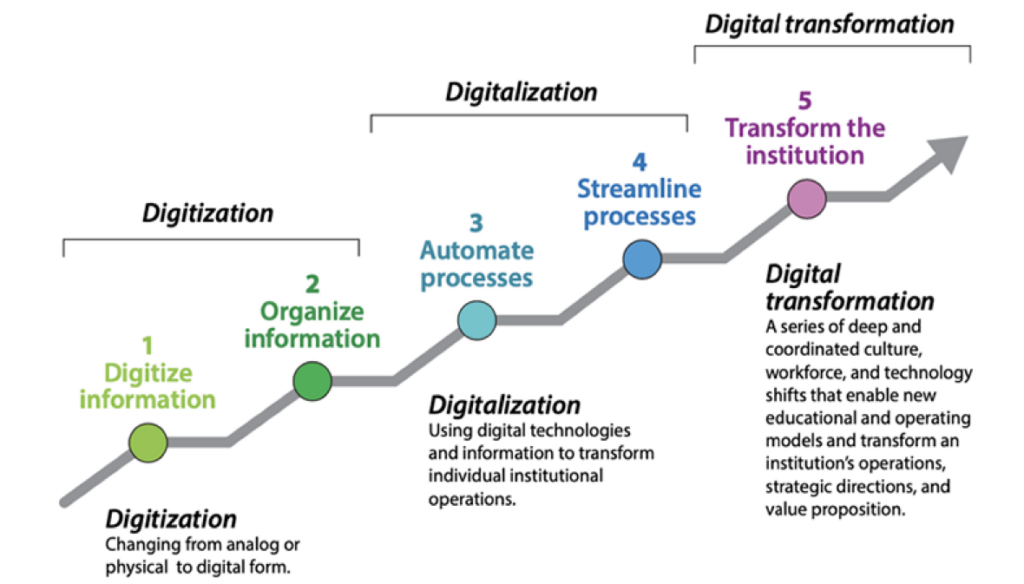
Why Everyone Should Know About Digital Transformation
Digital transformation is not just a concern for businesses; it significantly impacts society as a whole. Understanding digital transformation is essential for individuals because:
1. Impact on Society:
Digital transformation has reshaped industries, enabling new business models and changing how we live and work. It has revolutionised communication, education, healthcare, transportation, and more. Knowing about digital transformation allows individuals to navigate and adapt to the digital era.
2. Risks and Challenges:
There are potential risks and challenges associated with digital transformation. These include cybersecurity threats, privacy concerns, and the displacement of jobs due to automation. Awareness of these challenges helps individuals prepare for the future of work and make informed decisions about their digital presence.
3. Opportunities:
Understanding digital transformation opens up new opportunities for individuals. It enables them to embrace emerging technologies, acquire digital skills, and stay relevant in the digital economy. It also allows individuals to leverage digital platforms for entrepreneurship and career advancement.
4. Personal Growth and Empowerment:
Knowledge of digital transformation empowers individuals to adapt and thrive in a digitally connected world. It equips them with the ability to harness the benefits of technology, make smarter decisions, and stay ahead of digital advancements. It enhances personal growth and digital literacy.
Ultimately, everyone should know about digital transformation as it shapes how we live, work, and interact in today’s digital age.
Getting Started with Digital Transformation
To embark on the digital transformation journey, individuals and organisations need to take specific steps to ensure a smooth transition. Here are some essential guidelines:
1. Assess your current state
Before diving into digital transformation, evaluating your current processes, systems, and technologies is crucial. Identify areas that can benefit from digitalisation and prioritise them based on their potential impact.
2. Define your goals and strategy
Clearly define your objectives and align them with your overall business strategy. Determine how digital transformation can help you achieve those goals and create a roadmap for implementation.
3. Allocate resources
Allocate the necessary resources, including budget, skilled personnel, and time, to ensure the successful execution of your digital transformation initiatives. Consider investing in training programs to enhance digital skills within your organisation.
4. Embrace change and foster a digital culture
Change can be challenging, but embracing it during digital transformation is essential. Foster a culture that promotes experimentation, innovation, and collaboration to encourage employees to embrace new technologies and working methods.
5. Start small and scale up
Begin your digital transformation journey with pilot projects or small-scale initiatives. This approach allows you to learn, iterate, and refine your strategies before implementing them globally across your organisation.
6. Collaborate with partners and experts
Tap into the expertise of technology partners, consultants, and digital transformation experts. Collaborating with external stakeholders can provide valuable insights and guidance throughout your transformation journey.
7. Monitor and evaluate progress
Regularly monitor and assess the progress of your digital transformation initiatives. Set key performance indicators (KPIs) to measure success and make necessary adjustments to ensure continuous improvement.
8. Foster a culture of ongoing transformation
Digital transformation is a continuing process. Encourage a culture of continuous learning and adaptability within your organisation to stay ahead of evolving technologies and market trends.
By following these steps, you can kickstart your digital transformation journey and unlock your organisation’s potential for growth and innovation.
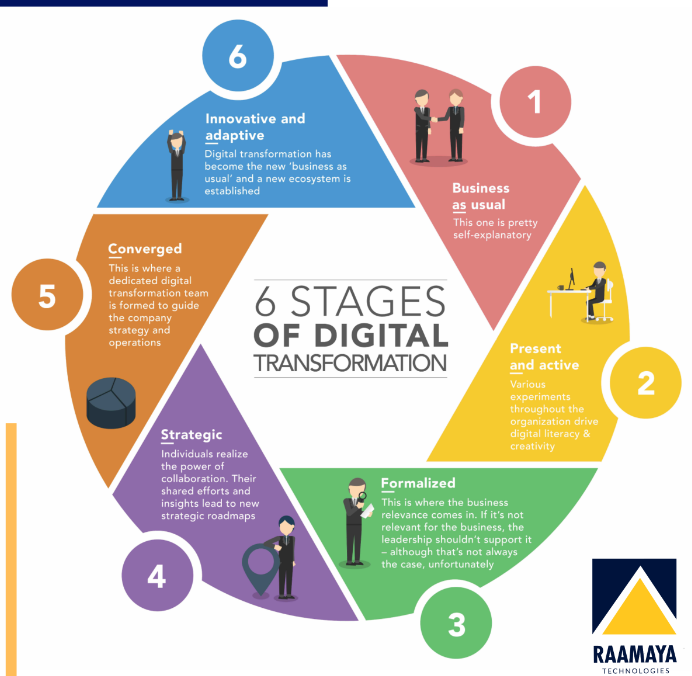
Digital Transformation in Today’s World
As technology advances rapidly, digital transformation is necessary for organisations across industries. Here are some critical insights into the impact and significance of digital transformation in today’s world:
Real-World Examples
Numerous organisations have successfully implemented digital transformation strategies, revolutionising their respective industries. For example:
- Amazon transformed the retail industry with its online marketplace and efficient logistics systems.
- Netflix disrupted the entertainment industry by shifting from physical DVDs to online streaming.
- Uber revolutionised the transportation industry by introducing a digital platform for ride-sharing.
Reshaping Industries
Digital transformation has fundamentally reshaped industries and business models, leading to new opportunities and challenges. It has:
- Enabled e-commerce, allowing businesses to reach customers worldwide and operate 24/7.
- Transformed traditional advertising and media through digital marketing and streaming platforms.
- Revolutionized healthcare with telemedicine, wearables, and data-driven personalised treatments.
Trends Driving Digital Transformation
Several trends are driving the need for digital transformation in today’s world:
- Increasing consumer expectations for seamless digital experiences and personalised interactions.
- The rise of mobile devices and connectivity, enabling access to information and services anytime, anywhere.
- The emergence of disruptive technologies such as artificial intelligence, blockchain, and the Internet of Things.
Staying Agile and Adaptive
Organisations must embrace digital transformation and remain agile and adaptive in constant digital disruptions to stay competitive. This requires:
- Continuously monitoring technological advancements and understanding their implications.
- Adopting a culture of innovation to foster experimentation and embrace change.
- Investing in employee training to develop digital skills and promote digital literacy.
In conclusion, digital transformation is both a challenge and an opportunity today. Organisations that actively embrace it can thrive and lead their respective industries, while those that resist or ignore it risk becoming obsolete.
The Role of Technology in Digital Transformation
Technology is crucial in driving digital transformation initiatives and enabling organisations to adapt to the digital age. Here are some critical aspects of the relationship between technology and digital transformation:
Enabling and Facilitating Digital Transformation Initiatives
Technology acts as an enabler and facilitator for digital transformation initiatives. It gives organisations the tools, platforms, and infrastructure to digitise their operations, processes, and customer interactions.
Technological Advancements Driving Digital Transformation
Rapid advancements in technology such as cloud computing, big data analytics, artificial intelligence (AI), the Internet of Things (IoT), and automation are major drivers of digital transformation. These technologies offer new capabilities, efficiencies, and opportunities for organisations.
Considerations for Adopting New Technologies
When adopting new technologies for digital transformation, organisations should consider factors such as compatibility with existing systems, scalability, data security, and privacy. Choosing technologies that align with the organisation’s goals and objectives is essential.
Leveraging Emerging Technologies for Competitive Advantage
Organisations can leverage emerging technologies for a competitive advantage in the digital landscape. By embracing cutting-edge technologies and exploring innovative use cases, businesses can differentiate themselves, enhance customer experiences, and drive growth.
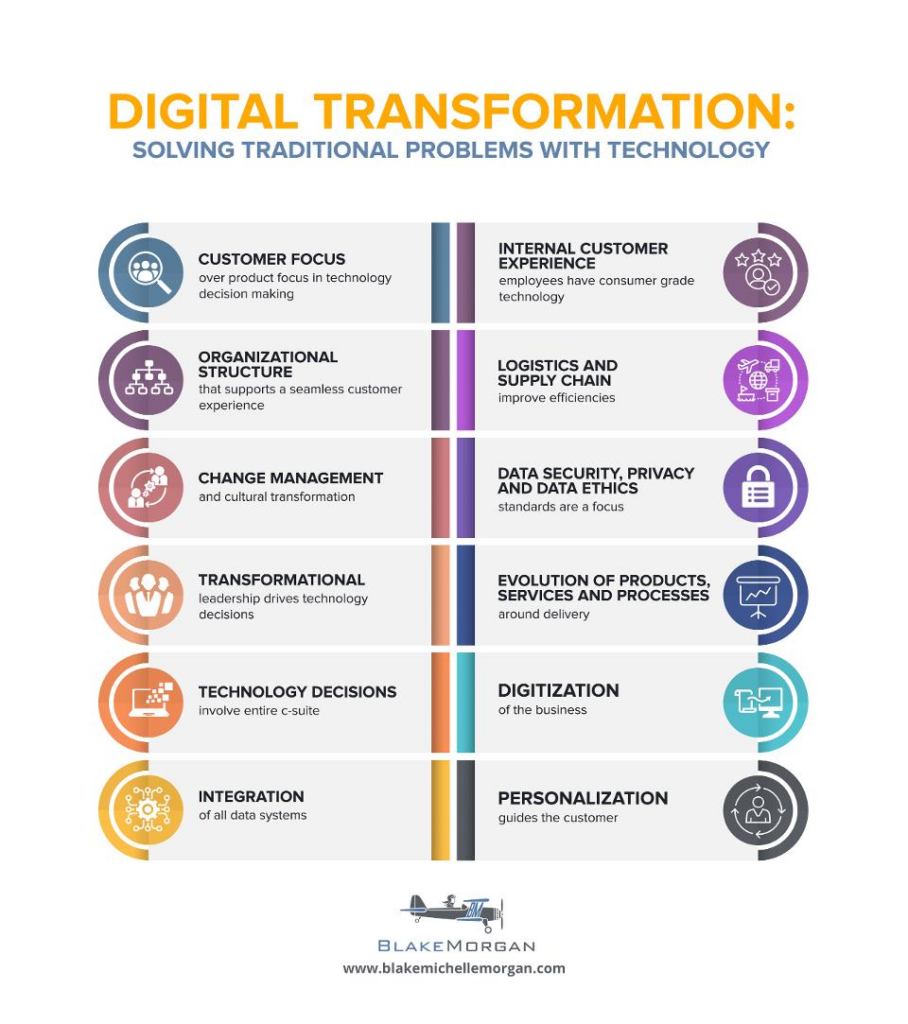
Digital Transformation: A Paradigm Shift
Digital transformation is a simple business strategy and a paradigm shift in how organisations operate and compete in the modern world. It requires a fundamental change in mindset and organisational culture to embrace the opportunities and challenges digital technologies present fully.
Traditional business models heavily rely on standard processes and practices, often with limited use of technology. On the other hand, digitally transformed models are characterised by integrating technology into every aspect of the business. This includes leveraging data analytics, cloud computing, artificial intelligence, and other emerging technologies to drive innovation, improve efficiency, and deliver personalised experiences to customers.
However, implementing digital transformation has its challenges. Organisations may need more support to change from employees and stakeholders comfortable with the status quo. Overcoming this resistance requires strong leadership, effective communication, and a clear vision for the organisation’s future.
Additionally, digital transformation may require a reevaluation of business processes and workflows. This can be a complex and time-consuming endeavour, as it involves identifying opportunities for automation, streamlining processes, and retraining employees to adapt to digital tools and technologies.
Despite these challenges, organisations that successfully navigate the paradigm shift of digital transformation can reap significant rewards. They become more agile, adaptable, and competitive in the digital age. By embracing digital technologies and leveraging data-driven insights, organisations can improve operational efficiency, deliver better customer experiences, and drive revenue growth and profitability.
Organisations need to establish clear metrics and key performance indicators (KPIs) to measure the success of digital transformation efforts. These include customer satisfaction, employee productivity, cost savings, revenue growth, and market share. Regular evaluation and adjustment of digital transformation initiatives are essential to ensure ongoing success in a rapidly evolving digital landscape.
Digital Transformation and Business Success
Digital transformation plays a crucial role in driving improved business performance and competitiveness. By embracing digital transformation strategies, organisations can unlock various benefits contributing to their overall success.
Driving Revenue Growth and Profitability
One of the key advantages of digital transformation is its ability to drive revenue growth and profitability. By leveraging digital technologies, businesses can streamline operations, expand their market reach, and deliver personalised experiences to customers.
Organisations can tap into new revenue streams through digital transformation initiatives, enhance customer engagement, and optimise their marketing efforts. This leads to increased sales, improved customer loyalty, and, ultimately, higher profitability.
Avoiding Pitfalls and Risks
While digital transformation offers immense opportunities, organisations must be aware of potential risks and pitfalls. Poorly executed digital transformation initiatives can lead to wasted resources, increased vulnerability to cyber threats, and disruption of core business processes.
Organisations should take a holistic approach to digital transformation to mitigate these risks, considering data security, scalability, and change management. By adopting best practices and seeking expert guidance, businesses can confidently navigate the complexities of digital transformation.
Measuring and Evaluating Success
Measuring the success of digital transformation efforts is crucial for organisations to assess the return on investment and make informed decisions. Key performance indicators (KPIs) such as revenue growth, customer satisfaction, and operational efficiency can provide valuable insights into the impact of digital transformation.
Organisations should continuously monitor and evaluate their digital transformation initiatives, adjusting as needed. By regularly analysing data and feedback, businesses can identify areas of improvement and ensure they stay on track towards achieving their goals.
Fostering Agility and Adaptability
Organisations must prioritise agility and adaptability to stay competitive in today’s rapidly evolving digital landscape. Digital transformation enables businesses to respond more to market changes, customer demands, and emerging technologies.
By embracing a digital mindset and fostering a culture of innovation, organisations can drive continuous improvement and keep pace with industry disruptions. This allows businesses to seize opportunities, overcome challenges, and future-proof operations.
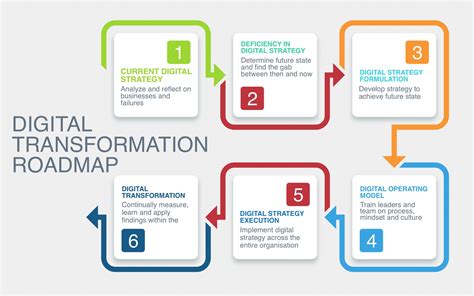
Digital Transformation: Challenges and Solutions
Implementing digital transformation initiatives can come with its fair share of challenges. It is essential for organisations to be aware of these hurdles and have strategies in place to overcome them. Here are some common challenges and their corresponding solutions:
Resistance to Change and Cultural Barriers
One of the main challenges organisations face during digital transformation is resistance to change. Employees may need more time to adapt to new technologies and processes, leading to a slower adoption rate. To address this challenge, organisations should focus on effective change management strategies. This includes communicating the benefits of digital transformation, providing training and support for employees, and involving them in decision-making.
Lack of Digital Skills and Talent
Another challenge organisations may encounter is a need for more digital skills and talent. Embracing digital transformation often requires individuals with data analytics, artificial intelligence, and cybersecurity expertise. Organisations can overcome this challenge by investing in upskilling and reskilling programs for their employees. They can also collaborate with external partners or hire professionals with the necessary digital skills.
Data Privacy and Security Concerns
The increased reliance on digital technologies in the transformation process brings about concerns regarding data privacy and security. Organisations must prioritise data protection and implement robust security measures. Conducting regular audits, ensuring compliance with data privacy regulations, and educating employees on best practices for data security are crucial in addressing these concerns.
Limited Budget and Resources
Implementing digital transformation initiatives can be expensive. Smaller budgets and resources can pose a challenge for organisations. Organisations can prioritise their digital transformation efforts, identify the most significant impact areas, and allocate resources accordingly to overcome this. They can also explore partnerships and collaborations with other organisations to share costs and resources.
Continuous Adaptability and Agility
Digital transformation is an ongoing process that requires continuous adaptability and agility. As digital technologies evolve, organisations must stay up-to-date and be prepared to embrace innovations. This requires a culture of innovation and a willingness to experiment and iterate. Organisations should foster collaboration and open communication to encourage ongoing adaptation and agility.
By addressing these challenges and implementing practical solutions, organisations can successfully navigate the digital transformation journey and reap the benefits of a digitally transformed business model.
Conclusion
In conclusion, digital transformation is a vital concept that impacts businesses, industries, and individuals. It has become crucial for organisations to stay competitive in today’s digital age, as not embracing digital transformation can lead to risks and missed opportunities for growth and innovation. By understanding digital transformation, individuals can benefit from improved operational efficiency, productivity, and data-driven decision-making.
However, digital transformation is more than just a concern for businesses. It profoundly impacts society, reshaping industries and business models. While there may be potential risks and challenges associated with digital transformation, there are also numerous opportunities for organisations to leverage emerging technologies and stay agile in the face of digital disruption.
Individuals and organisations can utilise available resources and tools to begin their digital transformation journey. It is essential to take steps to ensure a successful process, such as overcoming resistance to change and fostering a culture that embraces digital transformation. The role of technology is pivotal in enabling and facilitating digital transformation initiatives, and organisations should carefully consider the adoption of new technologies for competitive advantage.
Ultimately, digital transformation represents a paradigm shift in the business landscape, requiring a change in mindset and organisational culture. Its successful implementation improves business performance, revenue growth, and profitability. Organisations should carefully measure and evaluate the outcomes of their digital transformation efforts and continuously adapt to evolving digital technologies to ensure ongoing success.
